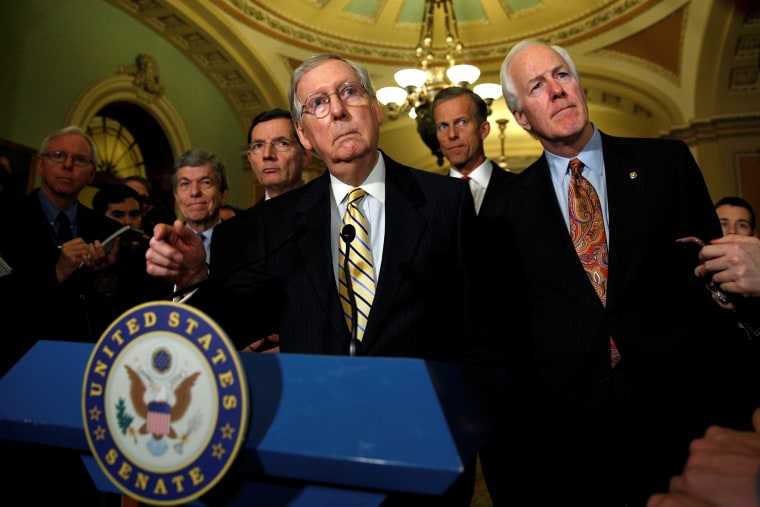It's hard not to feel a sense of déjà vu. A few weeks ago, Senate Majority Leader Mitch McConnell (R-Ky.), after writing a health care bill in secret, said he'd unveil his legislation on a Thursday, receive a report from the Congressional Budget Office the following Monday, and then hold a vote a few days later.
And here we are again, with McConnell writing a revised bill in secret, announcing a plan to unveil the legislation on Thursday, getting word from the CBO on Monday, and holding a vote a few days later. Politico reported:
Republican leaders are frantically pushing for a vote on the Senate's ailing Obamacare repeal bill next week, with Senate Majority Leader Mitch McConnell racing to placate warring moderates and conservatives with a new draft due within days, according to senators and aides.New bill text could be unveiled to senators as soon as Thursday, according to sources familiar with the proposal. A Congressional Budget Office score is likely to follow as soon as next Monday.
What's unclear is whether the Senate Republican leadership will have more success this time than the last.
An increasingly popular talking point among GOP lawmakers is the idea that their unpopular health care bill no longer exists, since McConnell's office is rewriting it. Like too many of the Republican arguments on health care, that's deliberately misleading: by all accounts, McConnell is looking to tweak, not fundamentally overhaul, the blueprint he unveiled in June.
And so we're left with another head-counting exercise. Are 50 GOP senators prepared to vote for this thing or not?
Last week was clearly unkind to those hoping to pass the regressive legislation. Senators were confronted by angry and terrified constituents who desperately hope the Republican bill fails, and the more members spent time away from Capitol Hill, the more intra-party support for the GOP proposal slipped backwards.
But funny things sometimes happen to politicians when they return to D.C. and instead of feeling pressure from constituents, telling them to do the right thing, lawmakers start feeling pressure from their party leaders, telling them to do the partisan thing.
Sen. Dean Heller (R-Nev.), for example, has looked like a solid "no" vote, but the Nevada Republican said yesterday that the bill could still be changed to earn his support. Similarly, Sen. Shelley Moore Capito (R-W.Va.), another critic of McConnell's original version, said she believed the GOP blueprint is salvageable.
In other words, this debate hasn't gone in GOP leaders' direction of late, but don't assume that health care advocates have prevailed.
Postscript: FiveThirtyEight did a nice job reviewing the relevant Senate Republican players, and where they stand.
